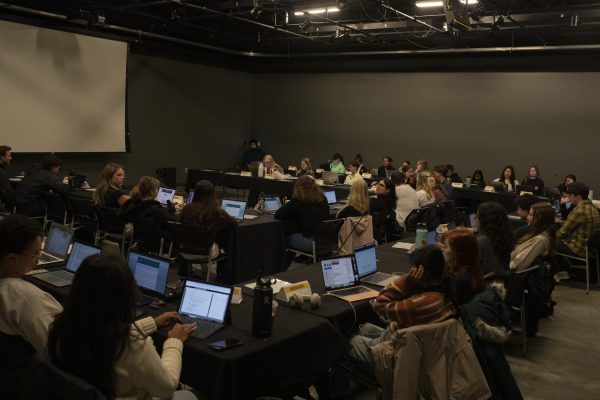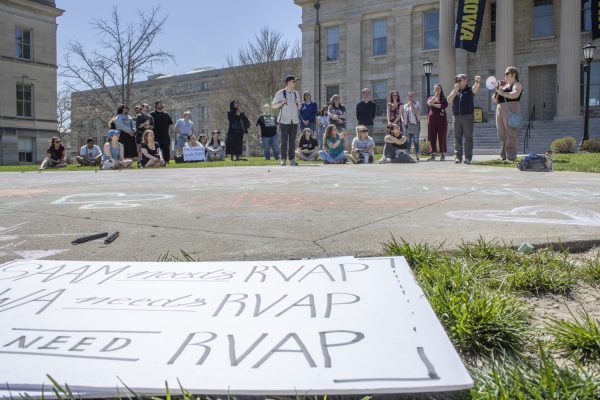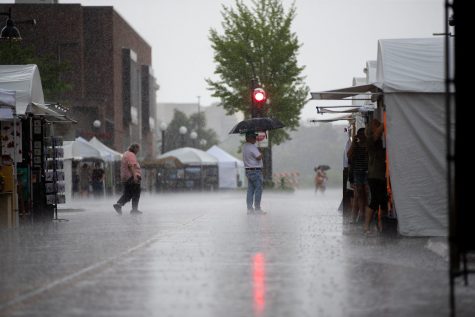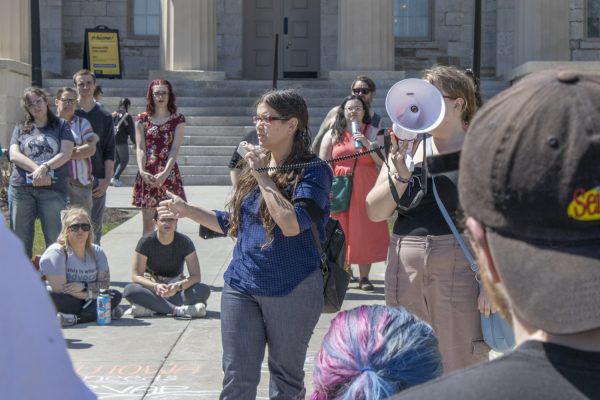New University of Iowa library collection documents daily life during COVID-19
In an effort to collect community voices and document this moment in history, University of Iowa archivists have created a library collection for stories that detail life amid the novel-coronavirus outbreak.
University of Iowa Main Library is seen on Wednesday, April 15, 2020.
April 22, 2020
University of Iowa Libraries hopes to collect the stories of the struggles that people are facing amid the novel-coronavirus pandemic, in an effort to establish a sense of community and document the environment of this pressing time in history.
David McCartney, UI archivist, said the idea of preserving community voices like this isn’t new and UI Libraries collected similar stories in 2008 during a flood that devastated Iowa City. This situation, however, differs due to its much larger, global scale.
“We are looking for anything that people, all throughout the Iowa City community, have to offer regarding their own stories and what impact COVID-19 has had on day to day life,” McCartney said.
There really is no precedent for what the community is going through right now, McCartney said. It’s important to collect documentation, gather community response, and give an opportunity for people to present memoirs of their experiences.
Such experiences don’t necessarily have to be recorded as written stories, they can be voice memos, photos and videos, multimedia story-tellings, as well as written works such as journal entries or stories. The only criteria is that those wishing to submit work must be affiliated with the UI or Iowa City community.
The collection of community stories will be presented on the UI Libraries and Digital Scholarship and Publishing Studio’s website. The submission process involves a questionnaire to help start the story, McCartney said, and then submitting the work through the website.
Submission requirements include mandatory permission from everyone involved, the submitter must be 18 years old or older, and any work must comply with any and all stay-at-home orders while documenting, McCartney said.
“It can be good therapy to write down things that are troubling or challenging us,” McCartney said. “We hope people will feel motivated in sharing these with us.”
Inspiration for the website came from multiple Big Ten universities who had already established a similar library collection to document COVID-19 stories.
RELATED: Iowa City grocers make changes to stay open during COVID-19 pandemic
Megan Badgley-Malone, collections and outreach archivist at Michigan State University, said routine activities like printing news articles and searching through websites that capture history. Given the scope of this event, Badgely-Malone felt her team needed to engage in additional proactive collecting. Archivists at peer universities had the same idea and began discussing it with others throughout the field.
The COVID-19 collection at Michigan State University has already received over 50 submissions, Badgley-Malone said. Submissions include photos from around campus and in East Lansing, people making Personal Protective Equipment, and a 20-minute documentary from a student about life during quarantine.
“I want people in the future to be able to see a complete picture of what happened during the pandemic — the positives and the negatives,” Badgley-Malone said. “Since it is being documented in the moment, future generations can see what daily life was really like — raw and unfiltered.”
The UI’s website is the result of collaboration between UI Libraries and UI Digital Scholarship and Publishing Studio. The two departments worked together to launch the website and make it accessible to students and members of the community.
Matthew Butler, senior director of the UI Digital Scholarship and Publishing Studio, said that the UI archivists reached out to his office about three weeks ago with an idea to create a platform to tell stories about coronavirus.
“The studio’s job in this project was building the intake form and creating a system for storing the content,” Butler said. “We will also be building an online exhibit for the collection once stories are received and reviewed.”
Butler said it’s important to share stories and experiences because they foster a sense of community. He emphasized the need for a diverse group of voices in this project, because everyone has different struggles and pressures.
Historians are reviewing how day-to-day activities were handled during the 1918 Spanish Flu, and how much technology and health care have evolved since then. Butler said he hopes this collection can serve as a similar tool for the future.
“This whole experience will change us for a long time,” Butler said. “We will have a different relationship with work, school, and people. Everyone has had to be more autonomous, and this will affect how we view the world around us.”














